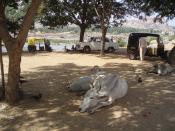CSE and After
Varna Sri Raman
"All substances are poisons; the right dose differentiates a poison and a remedy". Modern food regulation is about determining what that right dose is in our daily diet.
This paper aims to investigate how the Centre for Science and Environment exposé affected the daily life of consumers in terms of standards and product usage.
The Controversy
CSE made public its report on 5 August 2003. The report claimed to have found pesticide residues in samples of 12 soft drink brands procured by it in the open market in Delhi. The report made a huge splash in the media. Subsequently the report was discussed in the Lok Sabha on 6 August 2003.
A Joint Parliamentary Committee of 15 members was constituted on 22.8.2003 on 'Pesticide Residues in and Safety Standards for Soft Drinks, Fruit Juices and other Beverages.' The JPC was to: a) Judge whether the CSE findings were correct or not and b) Suggest criteria for evolving suitable safety standards for soft drinks, fruit juice and other beverages where water is THE major constituent.
The samples were tested at the Pollution Monitoring Laboratory (PML) of the Centre for Science and Environment (CSE).
The following people formed the JPC:
Chairman of JPC- Sharad Pawar :
÷ Lok Sabha:
o Ananth Kumar
o Anil basu
o Avtar Singh Bhadana
o Ramesh Chennithala
o Ranjith Kumar Panja
o E. Ahemed
o Akhilesh Yadav
o Sudha yadav
o K. Yerrannaidu
÷ Rajya Sabha:
÷ S.S. Ahluwalia
÷ Prithviraj Chavan
÷ Prasanta Chatterjee
÷ Prem Chand Gupta
÷ Sanjay Nirupam
÷ Secretariat:
÷ PK Sandhu Jt Secretary
÷ SD Gupta Principal Chief Parliamentary Reporter
÷ NC Gupta Under Secretary
The JPC collected evidence from:
o Representatives of 8 ministries
o Representatives of CSIR
o CFTRI
o Central Food Lab...


